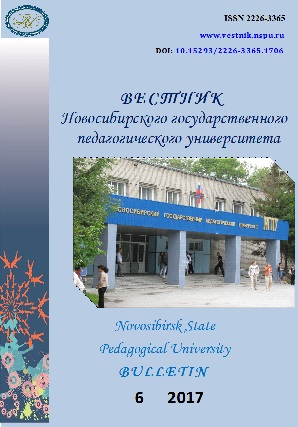Удовлетворенность жизнью и образовательным процессом как предикторы социально-психологической адаптации учителей
Teachers’ satisfaction with life and educational process as predictors of their social and psychological adaptation
Author(s): Nadezhda Valeryevna Sivrikova, Elena Gennadyevna Chernikova, Nadezhda Anatolyevna SokolovaSubject(s): Vocational Education, Higher Education , Individual Psychology, Sociology of Education
Published by: Новосибирский государственный педагогический университет
Keywords: Social and psychological adaptation; Adaptation of teachers; Satisfaction with life; Satisfaction with educational process; Satisfaction with activity; Professional adaptation; Professional developmen
Summary/Abstract: Introduction. The problem of studying the factors of teachers’ social and psychological adaptation has grown in importance in the light of recent increased requirements imposed to teachers in the conditions of updating the education system. Despite this, very few studies have investigated the impact of satisfaction with life and profession on teachers’ adaptation. Therefore, the purpose of this study is to identify the relationship between teachers’ social and psychological adaptation and their satisfaction with life and educational process. Materials and Methods. Data collection was carried out by means of the following techniques: Satisfaction with life by N. N. Melnikova; Satisfaction with various aspects of educational process by its participants by M. I. Lukyanova and N. V. Kalinina, and the questionnaire for studying the level of teachers’ social and psychological disadaptation. Mathematical data processing was performed using the multiple regression analysis. The sample consisted of 262 comprehensive school teachers from Chelyabinsk. Results. The research revealed rather high level of satisfaction with life and educational process among the surveyed teachers. Only 30 % of newly-qualified and 20 % of experienced teachers showed the evident signs of disadaptation. Differences in social and psychological adaptation of teachers depending on their work experience have been indicated in the criterion of distancing from the profession. It has been identified that experienced teachers are more satisfied both with the separate aspects and educational process as a whole. The newly-qualified teachers demonstrated more accurate hierarchy in satisfaction with the separate aspects of educational process. They are more satisfied with the organizational component and interaction with other participants of the process. There was a significant correlation between teachers’ level of social and psychological adaptation and the level of their life satisfaction. Moreover, the correlation between the level of life satisfaction and the level of satisfaction with the separate aspects of educational process was observed. Conclusions. The findings of this study suggest the following: 1) the level of teachers’ social and psychological adaptation to the profession depends on such factors of life satisfaction as inclusiveness in life, disappointment in life and fatigue from life; 2) the level of life satisfaction depends on such factors of satisfaction with educational process as satisfaction with activity and interaction with participants of educational process.
Journal: Вестник Новосибирского государственного педагогического университета
- Issue Year: 7/2017
- Issue No: 6
- Page Range: 87-100
- Page Count: 14
- Language: Russian

